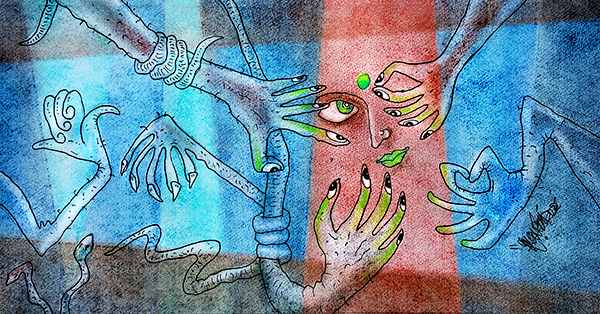Sexism at the Workplace
Workplace sexism is a much discussed topic. Yet, it’s really quite hard to pin down everything it includes. No definition truly encompasses all the different kinds of experiences people face. Each instance of workplace sexism is rather individual and nuanced. While an overarching umbrella of awareness does exist, it is rather easy for people to ignore several, more subtle instances of it, especially if it doesn’t directly involve them.
I personally feel what ties together all victims of such harassment, no matter the degree or the specific nature of it, is a sense of helplessness, however immense or minute.
I’m perfectly aware and I certainly acknowledge that sexism can affect all genders, but I am currently speaking from my experiences as a young woman in a male-dominated industry.
In the instances I want to write about, I toe the line of either being treated as a kid without the intellectual maturity or gravitas of a woman my age, or I get treated like a sex object. Either way, I find that my ability to make decisions for myself is constantly attacked.
A woman with a mind of her own is often not “desirable” enough, I’ve been told by my many. Perhaps, this translates as not “pliable” enough?
This is an observation that I have refused to acknowledge for years. This is possibly because I used to be a starry-eyed teenager when I started working and I didn’t mind being treated like a kid. After all, I was there to learn. I am still here to learn, but I am not here to be constantly “taught” the right way to be the “perfect” woman or the “ideal heroine”. It’s a waste of time wondering how to be a woman who has the right amount of appeal for the masses, or a woman who can grab someone’s attention a certain way, or how not to be a woman who brings attention to herself by talking too much, or having an opinion, or simply existing in a manner that doesn’t suit other people’s moods. It is really exhausting attempting to be an ideal that doesn’t exist. You can’t help but wonder, ‘What is it that I am doing wrong’?
I must write about a general and a specific instance that describe the range of sexism I have noticed and faced first-hand.
On a film set, there are all kinds of energies and power equations present. In fact, it is a rather interesting, albeit sometimes exhausting, experience trying to navigate them successfully.
When it comes to women, whether it is a stylist or a make-up artist, an assistant director, an actress, no matter your designation, I have noticed it takes extra energy to be taken seriously. It’s quite a conundrum really. If you’re “too nice”, far too often, people smile back at you but they don’t really listen to you when it matters. But most importantly, they fail to respect the position you hold. However, if you’re “too firm” about the way you interact with others or in terms of stating what you need done, as opposed to being easily dismissed or quietly uncomfortable, you’re called rude or you become a “bitch”. With regard to actresses specifically, it’s called “throwing tantrums”, a phrase I’m sure we’re all aware of.
Workplace sexism is not limited to an actual physical office or a set or studio. However, it can very well happen at a private space where your colleagues are present.
For example, not too long ago I was at a party at a friend/colleague’s place, where there were several other friends/colleagues, acquaintances and even strangers present.
I was very happy and comfortable, I believed it to be a safe space after all. Turns out it doesn’t matter; if someone has predatory intent no situation really deters them. One such acquaintance, who I hadn’t properly met before, came up to me and started chatting with me politely enough and so did I. This is someone in a position of power in my line of work. I purposely bring your attention to this fact. His wife is someone I’ve worked with and I respect and his daughters, one of whom I’m friends with, were all present at this get-together. Not that the absence of these specific factors would have made his actions any less wrong. Anyway, to cut to the chase, he manoeuvred me to a fairly empty space. I really didn’t think much of this initially, because the doors were open and people were all around. This was until he pulled me towards him and I was so shocked and scared and helpless in that moment that all I could manage to say was a polite “I don’t think we should do this”. I tried to move back but he pulled me closer and tried to kiss me regardless. This is not long after we politely started conversing for the first time ever. I was too stunned to do anything beyond moving my face away, so his lips landed on my cheek. I abruptly moved back and I was so out of my depth and still numb from it all, I made an excuse about needing a drink and walked out.
The worst part of this whole exchange, for me, was the fact that I felt helpless enough actually having to be polite to him. Whether it was because I didn’t want to make a scene, or be misunderstood or whether I feared not being taken seriously, or simply because of my regard for his family who were present there, I do not know. I told my friends immediately after about the incident in short and made sure I avoided him and stuck with them for the rest of the party.
Many others may have experienced harassment like this or perhaps much worse than this instance. Going through this made me realise how utterly helpless we are in the face of it. Not only when it actually happens to us, but also in terms of what to do about it after.
If you speak up, people either don’t believe you and you’re blacklisted in your work place, or they do but they forget eventually and it’s all smiles with the predator soon after. Even to be able to forgive someone who may accept it as their mistake, one requires an apology. An apology, however, is hard to come by, unless one is accused with enough evidence. In most cases, there is no proper evidence except the victim’s word for it. Turns out, in most cases it’s barely enough.
I don’t know whether this article will make a difference or not but even if it creates a tiny ripple I’m glad I wrote it.
It’s tough to stand up for oneself in a world that deems you the honorary position of a replaceable object. This is a world that makes you want to attempt to change yourself in all these impossible ways because ultimately you love your work and want to stick around. Women don’t have a choice but to stay strong in a place like this and that really shouldn’t be the case.






